
The current generation of NBA stars is still several years from retiring, but the young crop of elite talent has the league’s future in safe hands.
From new-era stretch bigs to versatile wings to stat-stuffing guards, the league has a diverse group of rising stars. We’re highlighting 25 of the best not yet 25 years old.
An important note: Zero incoming rookies are included because they haven’t proved anything at the NBA level. Past production is a significant factor in being featured.
Andre Drummond and Steven Adams are both mentioned, though both will turn 25 years old prior the season tipping off. Still, for now, they’re 24.
25. Jabari Parker, Milwaukee Bucks
We’d love to rank Jabari Parker higher. At this stage of his career, though, he simply cannot be trusted to stay on the floor. Bad injury luck isn’t his fault, but a pair of ACL tears limited him to 25 games as a rookie, 51 appearances in his third season and 31 showings last year. And Parker never quite looked himself after returning in 2017-18, averaging 12.6 points in a bench role — something about which he publicly expressed frustration. Parker has considerable upside as a scorer, but the NBA world is waiting to see that consistently.
24. Andrew Wiggins, Minnesota Timberwolves
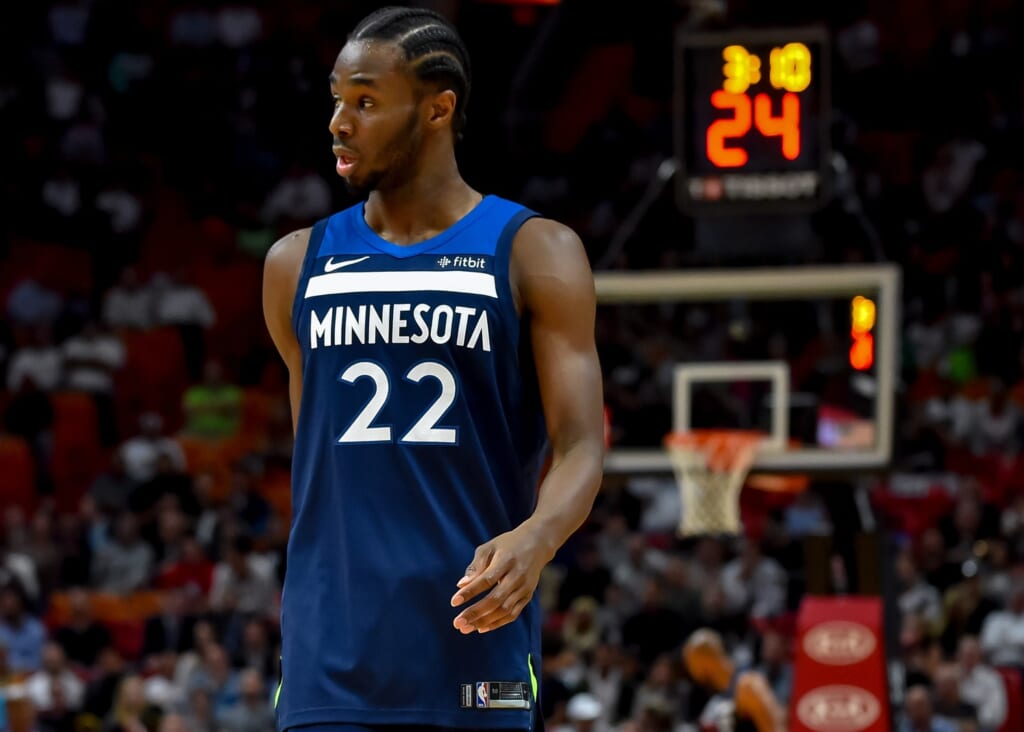
Perhaps his $140-plus million contract suggests he should be higher, but Andrew Wiggins must prove he’s more than a volume scorer. Entering his fifth year in the league, the Kansas product has tallied 19.7 points per game. However, his 33.0 clip beyond the arc and career average of 2.1 assists make him an inefficient, one-dimensional player. Still, Wiggins has terrific ability and is still only 23 years old. Although he’s apparently unhappy with his role, Wiggins is a valuable piece who could command a second unit if he wanted more touches.
23. Myles Turner, Indiana Pacers
Following a one-and-done season at Texas, Myles Turner entered the league to varied opinions. Could he become more than a rim-deterring presence? Through three years with the Pacers, that answer is a clear yes. While he’s still blocked 1.8 shots per game, the 6-foot-11 center has also developed into a capable three-point shooter. He’s knocked down 35.3 percent of his trifectas over the last two seasons. Turner is improving as a rebounder, and that progression will be essential to joining the upper-tier players at his position.
22. Clint Capela, Houston Rockets
Exactly what is Clint Capela’s upside? It’s an interesting question that probably won’t have an answer for a couple years. But there’s certainly no doubting his schematic fit in Houston. The 24-year-old is a hyper-efficient shooter because he basically doesn’t attempt anything outside of 10 feet. Capela paced the NBA with a 65.2 field-goal percentage last season, averaging 13.9 points. He also secured 10.8 rebounds and swatted 1.9 shots per game. The restricted free agent should return to the Rockets in 2018-19 with a fresh contract.
21. Julius Randle, New Orleans Pelicans
Newly signed by the Pelicans, Julius Randle spent the first four seasons of his career with the Los Angeles Lakers. In 2017-18, the forward put together his most efficient year so far with 16.1 points per game while connecting on 55.8 percent of his shots. That ranked 10th in the league. Additionally, he registered averages of 8.0 rebounds and 2.6 assists in only 26.7 minutes. Randle isn’t a terrific jumpshooter, but he’s competent enough to pull defenders out of the lane. And with Anthony Davis dominating wherever he pleases, Randle will be a fine complement.
20. Kyle Kuzma, Los Angeles Lakers
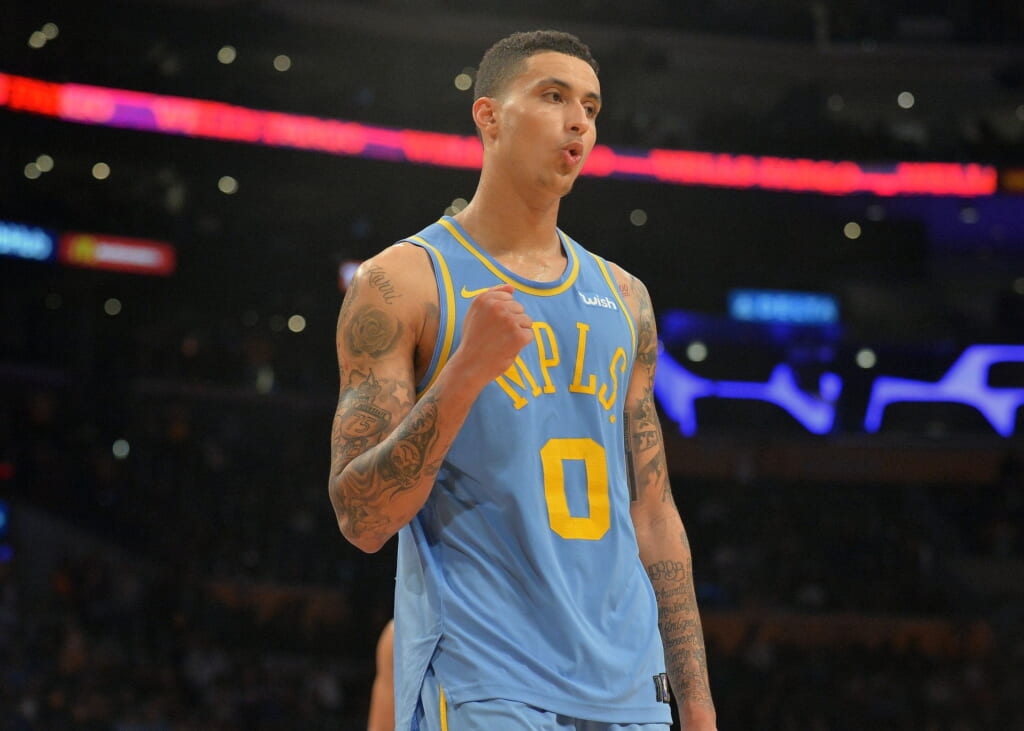
Four-year college players are sometimes devalued in the draft because they’re “old men” compared to the one-and-done standouts entering the league. Kyle Kuzma offered a much-needed reminder that older prospects have true breakout potential. He collected 16.1 points and 5.3 rebounds per game in his rookie campaign, shooting 33.6 percent beyond the arc. The forward’s future in Los Angeles remains in flux as the franchise flirts with Kawhi Leonard, but Kuzma absolutely has a clear place in the NBA in spite of initial hesitation.
19. Zach LaVine, Chicago Bulls
Right as Zach LaVine started to show All-Star potential, a knee injury robbed him of a full season between the Minnesota Timberwolves and Bulls. Nevertheless, his 18.9-point average in 2016-17 served as the breakout year of his campaign and platform of a high-dollar contract demand in restricted free agency this summer. Although his overall efficiency can be improved, LaVine sports a career 37.3 three-point clip and 3.2 assists per game. He’s capable of holding a large offensive role, but he’s built to operate as a secondary playmaker, too.
18. Aaron Gordon, Orlando Magic
Aaron Gordon has made noticeable improvements to his game every season. Both his scoring and steals averages have increased over all four years, reaching 17.6 and 2.3, respectively, last year. He also notched career-high clips of 7.9 rebounds, 1.0 steal and 0.8 blocks heading into a crucial offseason. And the Magic rewarded him with an $84 million contract. Granted, his production appears contingent on Orlando using him as a stretch 4 instead of a small forward. But if that happens, he’s a borderline All-Star and — for now — a franchise cornerstone.
17. Lauri Markkanen, Chicago Bulls
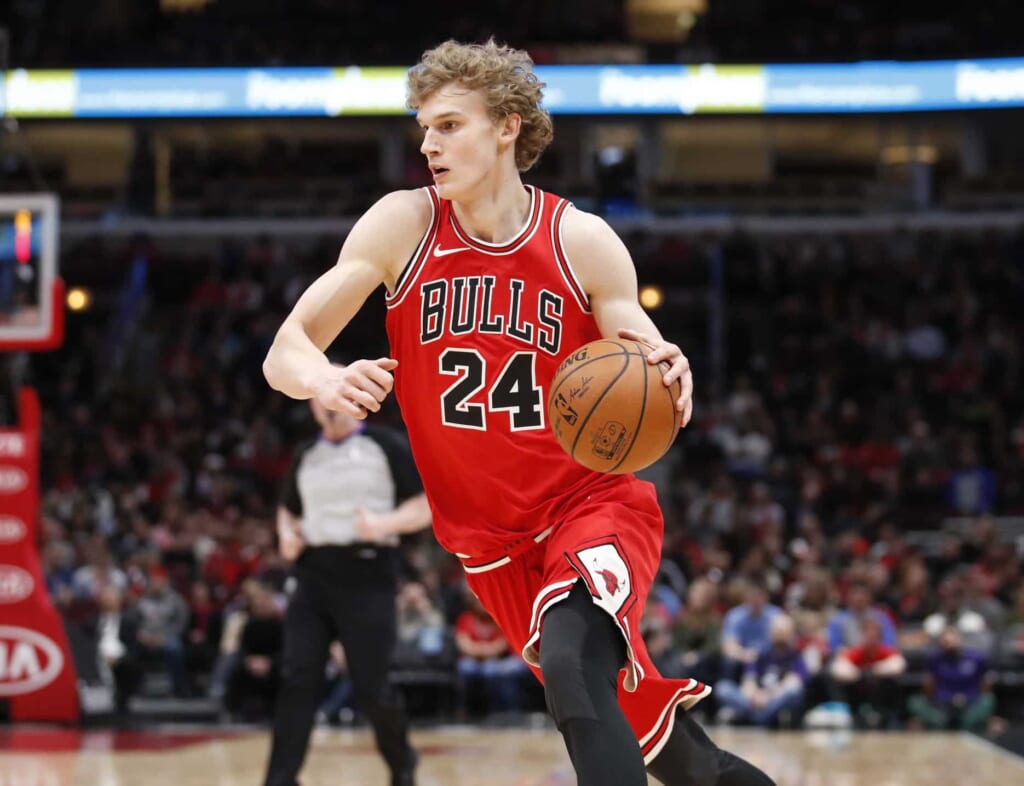
Not only does Lauri Markkanen have room to rise on the list, he’s likely going to ascend soon. The Arizona product gathered 15.2 points on 43.4 percent shooting, hitting 36.2 percent of his three pointers along the way. He averaged 7.5 rebounds and 1.2 assists, too. That was an impressive year for a rookie, especially one immediately asked to carry a sizable load. Markkanen opened the season without the assistance of LaVine, who was recovering from injury. But the experience should benefit Markkanen as he works toward being a top player in the East.
16. Lonzo Ball, Los Angeles Lakers
Lonzo Ball is a stat-stuffing machine. As a rookie, he piled up 10.2 points, 7.2 assists, 6.9 rebounds and 1.7 steals per game. According to Basketball-Reference.com, Ball became only the third first-year player in league history to record those numbers. Regardless of his shooting, that wide range of contributions will always have value. But we shouldn’t overlook those shooting troubles, either. Ball labored to a 36.0 overall clip and only connected on 30.5 percent of his trifectas. The Lakers will tolerate the bad to receive the good of Ball.
15. Jaylen Brown, Boston Celtics
Gordon Hayward’s injury was a horrible, terrible, no good, very bad thing. However, there’s an argument to be made Jaylen Brown wouldn’t have developed so quickly during his second year with Hayward on the floor. After averaging 6.6 points in 17.2 minutes per game, that average soared to 14.5 last season. Brown’s shooting percentage stayed relatively the same, but his three-point rate and efficiency increased. He buried 39.5 percent of his 4.4 triple attempts per night. Brown became valuable enough that he was discussed as a centerpiece to a Kawhi Leonard trade.
14. Jamal Murray, Denver Nuggets
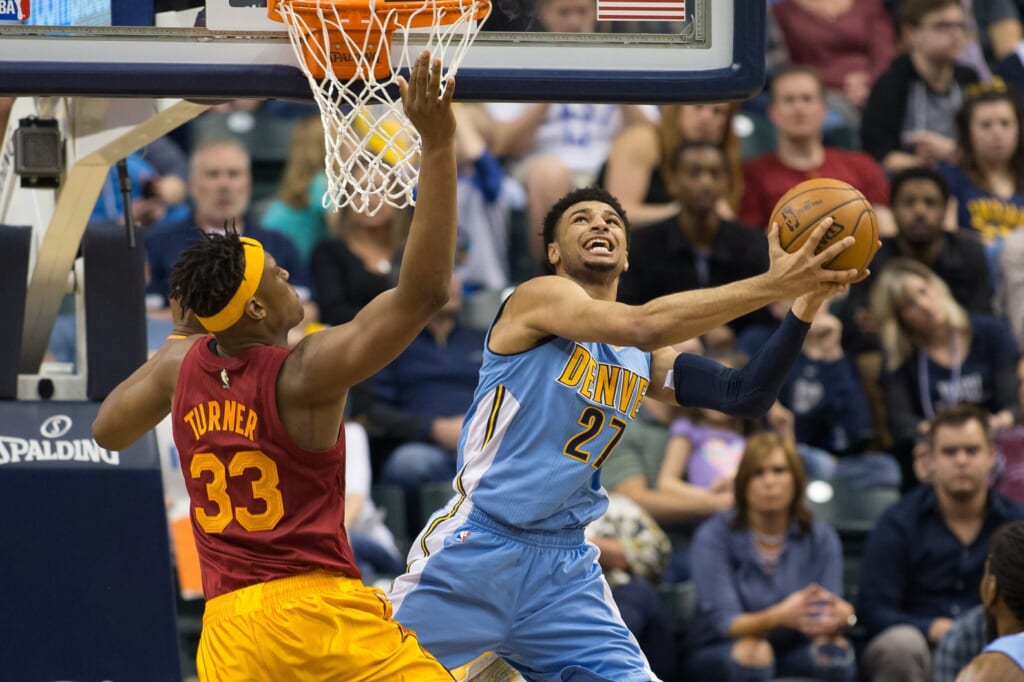
Jamal Murray held a 20-minute role as a rookie, but there’s no question he was prepared to start in 2017-18. His averages jumped from 9.9 points to 16.7 and 2.1 assists to 3.4. Additionally, though he mustered a 40.4 percent clip while lofting 8.9 shots as a rookie, he converted 45.1 percent of his 13.1 attempts last season. His efficiency climbed despite shouldering a larger burden on the offensive end. Murray is a work in progress on defense, but he’s proved an ability to oversee a high-caliber scoring attack at only 21 years old.
13. Brandon Ingram, Los Angeles Lakers
The Duke product has the look of an all-around superstar. During his age-20 season, Brandon Ingram posted 16.1 points on 47.0 percent shooting, snaring 5.3 rebounds and dishing 3.9 assists. He buried 39.0 percent of his three-pointers and logged a combined 1.5 steals and blocks. And, again, he was only 20 years old when accomplishing that. Development is not linear, but Ingram’s potential career trajectory is undoubtedly appealing. In a few years, the basketball world could be talking about Ingram as one of the best players in the league.
12. Gary Harris, Denver Nuggets
Casual basketball fans might be surprised to hear Gary Harris has a four-year, $84 million extension kicking in next season. Is a player not often mentioned in the national scope really worth that money? No doubt about it. The Michigan State product has quietly developed into a high-quality all-around player. He amassed a career-high output of 17.5 points last season, adding 2.9 assists and 1.8 blocks per game. Harris shot 39.6 percent beyond the arc and 48.5 percent, as well. Murray and Harris give Denver a dangerous backcourt for the long-term future.
11. Andre Drummond, Detroit Pistons
If you’re looking for one elite skill, Andre Drummond certainly has that. After only snaring 7.6 rebounds per game, the center has controlled the glass with 14.2 boards over the last five seasons — twice leading the league. Drummond also made noticeable strides as a free-throw shooter and passer in 2017-18, contributing career-high marks of 60.5 at the line and 3.0 assists. Combine that with 15.0 points, 1.6 blocks and 1.5 steals, and Drummond has All-Star levels of production. The problematic knock is whether he can elevate a team to excellence. So far, not yet.
10. Steven Adams, Oklahoma City Thunder
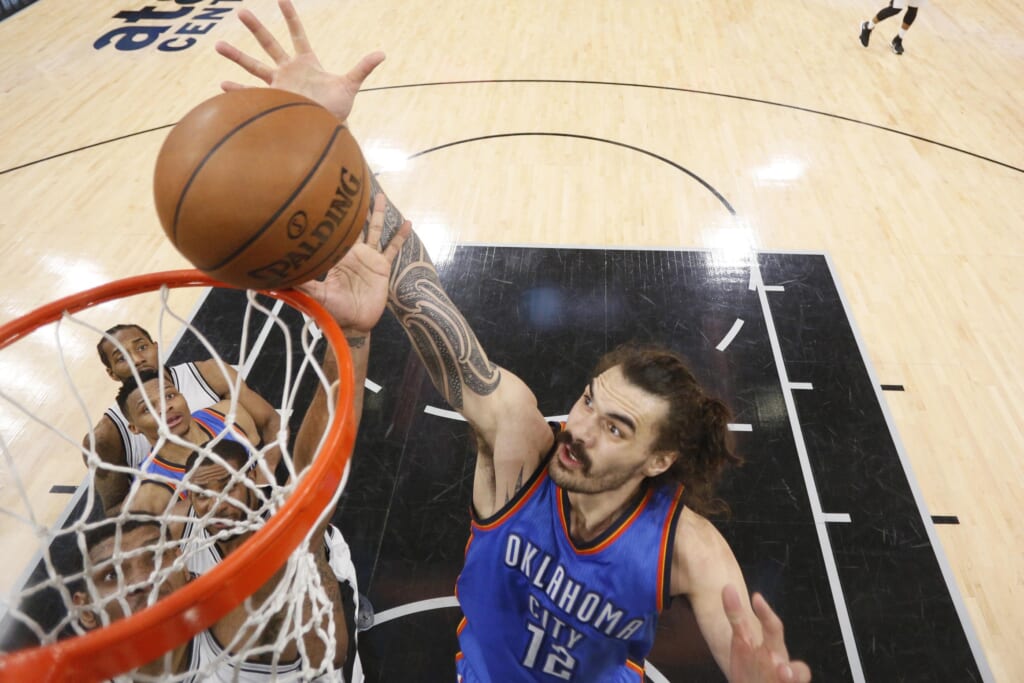
An elite finisher near the basket and a respected defender, Steven Adams has already earned a massive contract in OKC. He’ll earn at least $24.1 million over each of the next three seasons. Adams boasts a career 58.6 field-goal percentage, which at this rate will be among the highest of all time. In addition to registering 13.9 points and 9.0 rebounds in 2017-18, Adams had 1.2 steals and 1.0 block per game. His value is consistently seen on both ends of the floor. Adams will enter the age-25 threshold soon, but he deserves one final nod before graduation.
9. Devin Booker, Phoenix Suns
The arrival of Josh Jackson and Deandre Ayton over the last two seasons has brought a renewed outlook to Phoenix. But it wouldn’t be that positive if Devin Booker wasn’t on an intriguing track as a go-to scorer. He poured in 24.9 points per game in 2017-18, hitting career-best marks of 38.3 percent from long distance and 43.2 overall. That efficiency must improve for him to reach the upper tier of scorers, yet there’s reason to believe as the surrounding cast improves, that will. And the $158 million the Suns committed to him suggest they do, too.
8. Jayson Tatum, Boston Celtics
It turns out Danny Ainge knew what he was doing. When the Celtics traded out of the No. 1 overall spot in the 2017 draft, reactions widely focused on “why would you pass up Markelle Fultz?!” Jayson Tatum showed Boston at least scouted him properly. He quickly entered the starting lineup and netted 13.9 points per appearance during the regular season. Then, in the playoffs, Tatum upped that average to 18.5 and became one of the most prolific rookie scorers in NBA postseason history. Boston’s depth won’t demand he stars in 2018-19, but Tatum appears ready anyway.
7. Donovan Mitchell, Utah Jazz
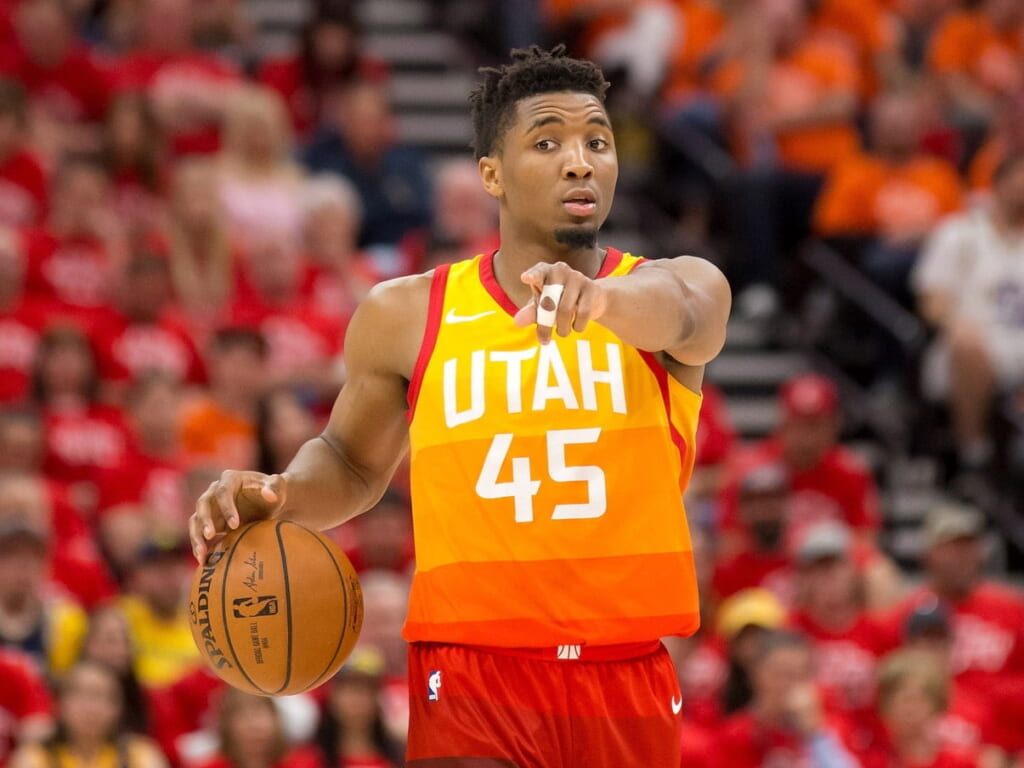
On paper, the loss of All-Star forward Gordon Hayward seemed glaring. Where would the Jazz turn for their No. 1 scoring option? Donovan Mitchell, the 13th pick in the 2017 draft, assumed that role and never looked back. The Louisville product ended his rookie campaign with 20.5 points per game on 43.7 percent shooting, dishing 3.5 assists and nabbing 1.7 steals while propelling Utah to the playoffs. Mitchell’s contributions rose during the postseason to an average of 24.4 points. And despite the second-round exit, he offered a clear sign he’s prepared to lead the Jazz.
6. Kristaps Porzingis, New York Knicks
New York went nowhere fast when the offense relied on Carmelo Anthony. The emergence of Kristaps Porzingis made the All-Star expendable, though. He shouldered a hefty scoring load and tallied a career-best 22.7 points per game, carrying a middling supporting cast to a near-.500 record when healthy last year. Unfortunately for the Knicks, a torn left ACL took Porzingis off the court midway through the season. Now, he probably won’t return until approximately February of 2019. But the franchise knows it has a cornerstone following his recovery.
5. Joel Embiid, Philadelphia 76ers
You can’t blame Philly fans for being nervous every time Joel Embiid steps on the floor, but “The Process” finally completed a (mostly) healthy season in 2017-18. The center tallied 22.9 points — which ranked 12th in the NBA — and filled the box score. He also gathered 11.0 rebounds, 3.2 assists and 1.8 blocks, also earning his first All-Star nod. Although a broken orbital bone limited his postseason participation, he still averaged a double-double over eight appearances. Embiid would be the Sixers’ most important piece if it weren’t for Ben Simmons.
4. Karl-Anthony Towns, Minnesota Timberwolves
Dysfunction may be finding its way to Minnesota, but Karl-Anthony Towns is a premier individual talent — even if Jimmy Butler really is “fed up” with him. Over the last two seasons, Towns has poured in 25.1 and 21.3 points per night. At only 22 years old, he’s already established himself as a premier scorer. His shooting range and efficiency has also increased every year, and Towns posted a 42.1 three-point rate in 2017-18. Although his defense may never be outstanding, Towns has so much value offensively he’ll always be a featured player.
3. Ben Simmons, Philadelphia 76ers
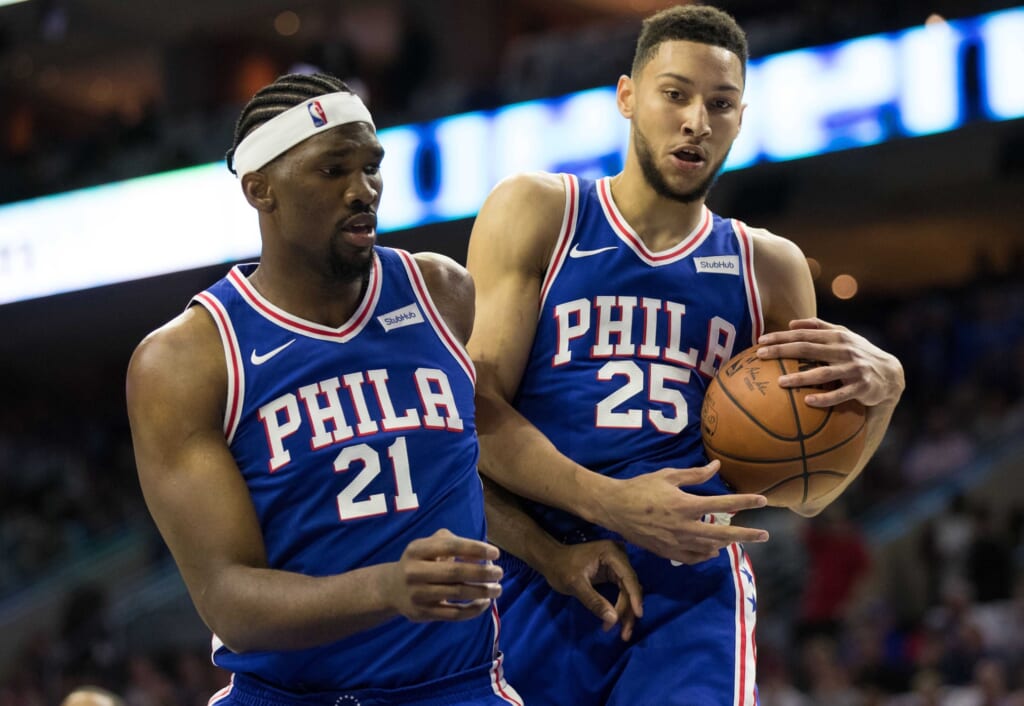
Regardless of whether you call him a rookie or want to consider something else, Ben Simmons had a remarkable first season. The 6-foot-10 point guard shredded defenses for 15.8 points and 8.2 assists per contest. Most impressively, he accrued those numbers and still shot 54.5 percent despite taking (and missing) a total of 11 three-pointers all year. In this era of basketball, spacing is integral to offensive success. He thrived anyway. Simmons chipped in 8.1 rebounds and 1.7 steals to help the Sixers snap a six-year postseason drought.
2. Nikola Jokic, Denver Nuggets
Nikola Jokic will probably never be a great defender. Good luck stopping him on the other end, though. A recent recipient of a $148 million max contract, Jokic notched 10 triple-doubles last season. He averaged 18.5 points, 10.7 rebounds and 6.1 assists — numbers only recorded by Russell Westbrook, Kevin Garnett, Larry Bird, Wilt Chamberlain and Oscar Robertson in NBA history, per Basketball-Reference.com. Throw in Jokic’s 39.6 three-point percentage, and he’s a threat to create or convert scoring opportunities at any place on the floor.
1. Giannis Antetokounmpo, Milwaukee Bucks
As a rookie in 2013-14, Giannis Antetokounmpo contributed 6.8 points in a 24-minute role. Back then, could anyone really have anticipated this? The “Greek Freak” has developed into a two-way superstar whose length simply overpowers opponents. In addition to scoring 26.9 points on 52.9 percent shooting last season, Antetokounmpo grabbed 10.0 rebounds, dished 4.0 assists, grabbed 1.5 steals and swatted 1.4 shots. Oh, and he’s still a below-average three-point shooter. There’s plenty of room to improve, and Antetokounmpo is just 23 years old.